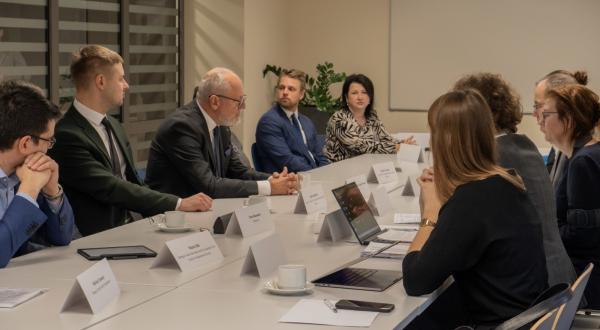RSU Faculty of Medicine adopts new exam format: national examination to be held in simulated settings
On 28-29 May, part of the graduating class of prospective doctors took one of the stages of the national examination in a new format at the Rīga Stradiņš University Medical Education Technology Centre (RSU METC). The new format includes a simulation-based environment with simulated patients. While international students in the Medicine programme already tested this approach in the winter exam period by having to interpret a patient’s clinical case in a simulated environment with a simulated patient, the spring exam period offered Latvian students the opportunity to take their exams in this format for the first time.
Until now, the practical part of the national examinations for all prospective doctors was conducted exclusively at medical institutions, which were assigned to each student randomly: amongst others the Riga East Clinical University Hospital, the Pauls Stradiņš Clinical University Hospital, the Children’s Clinical University Hospital, the Hospital of Traumatology and Orthopaedics, the Maternity Hospital.
Although examinations at real healthcare institutions provide valuable experience for students, in recent years, the challenges associated with this format have become increasingly evident, requiring alternative solutions. While the number of students continues to grow, the capacity of healthcare institutions and patient availability are decreasing, primarily due to organisational, systemic, and legal restrictions.
Interpreting clinical cases in a simulated environment with simulated patients is a new and innovative approach in Latvian medical education. However, this method is widely recognised and established as an effective teaching and assessment practice elsewhere in the world. One of the key advantages of this approach, in the context of examinations, is the possibility to avoid content-related and organisational restrictions, most notably, the lack of patients. Additionally, this method allows for standardising exams and the ability to assessing students’ performance objectively and structurally. It is an opportunity to assess students' clinical knowledge more accurately, as well as doctor-patient communication skills, clinical reasoning and decision-making ability, as well as professional competence within a safe and controlled setting close to a hospital environment.
To ensure the examination process, several simulated wards were set up at the RSU METC, namely paediatrics, obstetrics and gynaecology, infectology, surgery, traumatology and orthopaedics, and internal diseases. Students were randomly assigned to one of these wards, where they were met by a simulated patient - a specially trained person who, following a pre-designed scenario, recreated a specific clinical situation.
The examination was observed by Prof. Peter E. Goretzki, Member of RSU Council, and Assoc. Prof. Ingus Skadiņš, Vice-Dean of the Faculty of Medicine, who stated: ‘There is no doubt that simulations play a crucial role in both the learning and assessment processes.
Simulation scenarios, simulated patients, and teamwork in simulated environments are not the future of medical education, but rather already a reality and an integral part of a high-quality medical study process.
The new simulation-based examination format will be established permanently. The experience gained clearly demonstrates the value and potential of this format. It is an effective solution that will be systematically developed and refined to be integrated as part of the national examination process.’
The actors who played patients in the examination process also acknowledged that the students confidently demonstrated their knowledge and clinical skills, clearly demonstrating their readiness to tackle the professional challenges and the work in a real healthcare environment.
The RSU METC team is proud of these achievements and is confident that this examination format will become standard practice in the future and will also be introduced in other healthcare study programmes.


































